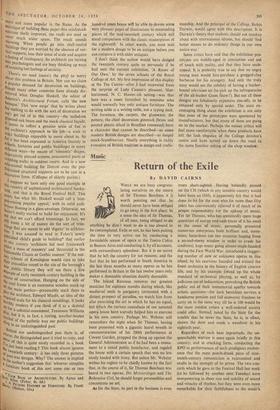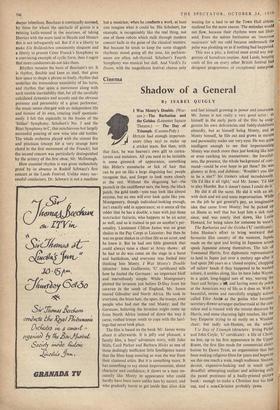Music
Return of the Exile
By DAVID CAIRNS WHILE we are busy congratu- lating ourselves on the return of Sir Thomas Beecham it is worth pointing out that he should never have been obliged to go away in the first place: In a sense the idea of Sir Thomas, of all men, being obliged to do anything he didn't want to do is too absurd to be contemplated. Exile or not, he has been putting the time to very active use by conducting a formidable season of opera at the Teatro Colon in Buenos Aires and conducting it, by all accounts, with extraordinary splendour. But it is no secret that he left the country for tax reasons; and the fact that he has performed in South America in the last three months as many operas as he has performed in Britain in the last twelve years only makes a damnable situation doubly damnable.
The Inland Revenue removes our greatest musician for eighteen months during which, like mediwval souls in purgatory tormented with a distant prospect of paradise, we watch him from afar exercising the art in which he has no equal, but which the curious custodians of our national opera house have scarcely helped him to exercise in his own country. Perhaps Mr. Webster still remembers the night when Sir Thomas, having been presented with a gigantic laurel wreath in commemoration of his 200th performance at Covent Garden, propped the thing up against the General Administrator as if he had been a monu- ment to a noted public benefactor, and regaled the house with a curtain speech that was no less nicely loaded with irony. But unless Mr. Webster wishes his regime to be chiefly known by the fact that, in the course of it, Sir Thomas Beecham was heard in two operas, Die Meistersinger and The Bohemian Girl, he should forget personalities and concentrate on art.
As for the State, its part in the business is even more short-sighted. Having belatedly pinned on the CH (which in any sensible country would have been an OM), it apparently felt that it had done its bit for the man who for more than fifty years has conveniently relieved it of much of its proper responsibility for the upkeep of music. Yet Sir Thomas, who has unstintedly spent huge quantities of energy and cash (most of it his own) in the cause d music, personally presented numerous enterprises both brilliant and, some- times, hazardous (on one occasion leaping from a second-storey window in order to evade his creditors), kept music going almost single-handed during the First World War, introduced a stagger- ing number of new or unknown operas to this island, by his exertions founded and trained the finest orchestra in the history of English concert life, and by his example forced up the whole standard of orchestral playing, as well as, by judicious use of indiscretion, provoking the British public out of their immemorial apathy towards artistic questions—for such herculean services a handsome pension and full economic freedom to carry on in the same way till he is 100 would be the most modest return a well-ordered society could offer. Instead, taxed by the State for the trouble that he saves the State, he is, in effect, shown the door and made a wanderer in his eightieth year.
Regardless of such base ingratitude, the un- quenchable warrior is once again briefly in this country, and in cracking form, conducting the RPO in performances of such prodigious exuber- ance that the most punch-drunk piece of nine- teenth-century romanticism is rejuvenated and exults in the strength of its prime. The two con- certs which he gave in the Festival Hall last week (to be followed by another next Tuesday) were overpowering in sheer size and nobility of sound and vivacity of rhythm, but they were even more remarkable for their faithfulness to the music's deeper intentions. Beecham is continually accused, by those for whom the spectacle of genius is a twisting knife-wound in the neuroses, of taking liberties with the score (and in Haydn and Mozart this is not infrequently so). But if it is a liberty to make Ein Heldenleben consistently eloquent and a liberty to present Cesar Franck's Symphony as a convincing example of cyclic form, then I regret that more conductors do not take them.
Rhythm remains the basis of Beecham's art. It is rhythm, flexible and keen as steel, that gives him space to shape a phrase so finely, rhythm that underlies the tremendous unanimity of his tuttis, and rhythm that spins a movement along with such nimble inevitability that, for all the carefully calculated dynamics and accents and the obvious presence and personality of a great performer, the music seems charged with an independent life and motion of jts own, creating itself spontane- ously. I felt this especially in the finales of the 'Italian' Symphony, Schubert's No. 3 and the Bizet Symphony in C, that mischievous but largely successful pouring of new wine into old bottles. The whole orchestra played with the utmost fire and precision (except for a very strange horn chord in the first movement of the Franck); but the second concert was particularly distinguished by the artistry of the first oboe, Mr. McDonagh.
How essential rhythm is was given melancholy proof by its absence in Rudolf Schwarz's first concert at the Leeds Festival. Unlike many suc- cessful conductors, Dr. Schwarz is not a machine but a musician; when he conducts a work, at least you imagine what it could be. His Schubert, for example, is recognisably like the real thing, not one of those robots which stalk through modern concert halls in the guise of the classical masters. But because he tends to keep the same sluggish rhythmic mood going all the time, his perform- ances are often sub-thyroid. Schubert's Fourth Symphony was musical but dull. And Verdi's Te Deum, with the magnificent festival chorus only waiting for a lead to set the Town Hall ablaze, misfired for the same reason. The melodies would not flow, because their rhythms were not liber- ated. Even the subito fortissimo on 'immense! maiestatis' left me cold because underneath the pulse was plodding on as if nothing had happened.
This was a pity; a festival must avoid any sug- gestion of humdrum routine. And Leeds, heaping coals of fire on every other British festival had designed programmes of exceptional enterprise.



































 Previous page
Previous page